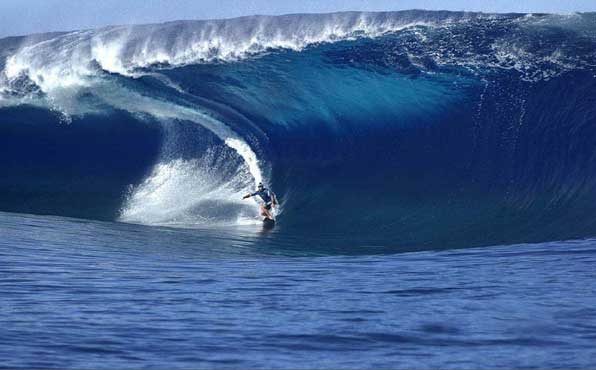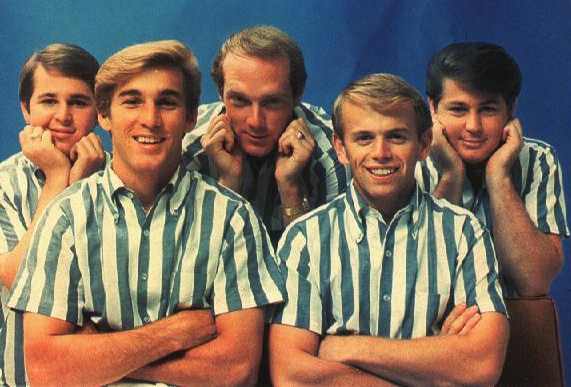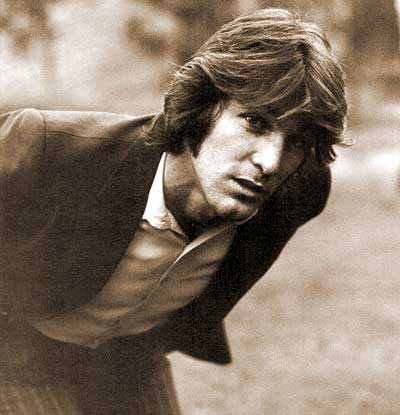Of Surf, Sun and Shadows
Or, When I Grow Up To Be A Man
By David McGee
The Beach Boys: U.S. Singles Collection—The Capitol Years (1962-1965)
For those who grew up with the Beach Boys the release of the 16-CD The Beach Boys: U.S. Singles Collection—The Capitol Years (1962-1965) is yet another chance to ponder the world of their youth and wonder anew whether it was ever as clear-cut as these great songs made it out to be. Of course it wasn’t; there were tensions all over the globe during the years in question, and especially on the home front, with Vietnam and the Civil Rights Movement heating up. But with no Internet, only three TV networks broadcasting the day’s events, no FM radio to speak of, and AM dominated by rock ‘n’ roll, it was easy to be a kid back then.
If you were old enough to drive, gas was 25 cents a gallon, and with a part-time after school job, buddy, you could round-round-get-around (at least until your money ran out chasing the girls whose gas tanks stayed on Full courtesy daddy’s credit card). Even in land-locked Oklahoma, where I grew up, we may not have had surfing, but we could dream about it while we were getting char-broiled at the lake, and we most certainly had girls, cars, sock hops, drive-ins, cruising, cheerleaders, and, first, the can-do spirit JFK had brought to America (anyone remember 50-mile hikes? Two friends and I made it 16 miles, to Jenks, Oklahoma, from Tulsa’s north side, before placing an apologetic call to one’s parents for a ride home), then, post-assassination, the boundless, optimistic energy ensuing in the wake of the Beatles’ arrival on these shores. Oceans weren’t rising, glaciers weren’t receding, polar ice caps weren’t melting, honeybees and rain forests weren’t vanishing.
The Beach Boys could do no wrong during the years chronicled in this latest retrospective. It would be interesting to see the group’s tour itinerary from 1962 through 1965, because it seemed like they were playing my home town about every two or three months, and when they weren’t, James Brown was, if memory serves, which it probably doesn’t. Maybe it was because the life-affirming spark their music ignited in young people attending their shows had a robust half-life, so much so that the chatter about how great their concerts were sustained across time until they came ‘round again.
When it was released in 1962, “Surfin’ Safari” (the big hit, backed by “409,” a lesser charting item nationally but beloved in my part of the world, because every guy I knew cherished the idea of having a “fine, fine 409”), the earliest of the singles in this box, I was in junior high school. My cousin, two years my senior, was then in a heavy high school romance. He was a star swimmer, self-consciously cool, popular, member of the Barons social club, and dating a drop-dead gorgeous cheerleader. Add to his attributes obnoxious, self-absorbed, condescending, duplicitous and congenital dishonesty, then cue the applause for his beloved dumping him unceremoniously, sending him on a downward spiral that culminated in his dropping out of school to join the Navy (well, he was a good swimmer) and then going AWOL before being nabbed and dishonorably discharged. But in his pre-Navy grief over his lost love, he opened a new window on the Beach Boys’ (specifically Brian Wilson’s) work for me, after which I never heard the band’s music the same way again, and in fact elevated it to a personal pantheon alongside the Beatles’. It wasn’t even a Beach Boys album, per se, that provided this insight, but rather an all-instrumental album of Beach Boys music by a collection of anonymous, all-star session players dubbed The Hollyridge Strings, who had already scored big with an easy listening collection of Beatles songs (which would lead to several more volumes of same through the ‘60s; at one time the group had three albums in he Top 20 simultaneously). The Strings were the brainchild of a classically trained Capitol Records executive, Stu Phillips, whose impressive resume lists a wealth of scores for TV and film projects, and as a producer includes the Marcels’ “Blue Moon,” Shelley Fabares’ “Johnny Angel,” and James Darren’s “Goodbye Cruel World,” all terrific ‘60s singles. (He even produced the Ronettes before Phil Spector got hold of them, but that’s another story.) Clearly Phillips, with his trained ear, heard things in melodies that the rest of us, when immersed in the experience of a song, might not intuit so easily, if at all. The Strings’ Beach Boys Songbook underscores the winsome nature of so many Brian Wilson melodies, touchingly so; even a hard-ass such as my cousin was reduced to tears by the instrumental version of “Surfer Girl.” When he left for the Navy, he bequeathed to me his Beach Boys collection, which I still have, and I found there was a lot more going on in Brian Wilson’s songs than the Boys were getting credit for. I didn’t know he wrote “The Warmth of the Sun,” the B side of 1964’s fierce Top 10 single, “Dance, Dance, Dance,” in the aftermath of JFK’s assassination (remember, there was no rock press to speak of at the time), but the lyric, “The love of my life/She left me one day/I cried when she said/I don’t feel the same way/Still I have the warmth of the sun/within me tonight…” was enormously comforting in difficult times that had nothing to do with matters of the heart, but everything to do with getting through a day with all the stuff coming at you as a teenager. Although a three-sport athlete who enjoyed the cheerleaders’ attention, I found meaningful reflection and affirmation for my own need for solitude in “In My Room,” when others were exulting over its hit A side, “Be True to Your School” (this is a good spot to note that the singles in this box contain three, often four cuts, many being a stereo or mono album mix of the single, which are sometimes strikingly different, none more so than the sluggish, inferior mono album mix of “Be True to Your School,” on which the single’s cheerleaders—who were the vocal group the Honeys, among their members Brian Wilson’s future wife—are completely absent, to the track’s considerable detriment). “When I Grow Up To Be a Man,” “Don’t Worry, Baby,” “Let Him Run Wild”—there was much wisdom to be gained from these songs, direction even, and I’m hardly the first to point this out. The Boys were grappling with the realities of alienation, the pressures of conformity, sexual politics, and self image. They were celebrating an exalted moment in American culture and the liberating, carefree pursuit of that moment, but in the shadows of their sunny pursuits lay hints of looming cataclysms. Who knew it would sour so soon? (The reader is invited to debate what the meaning of “it” is.)
The Beach Boys in an early publicity shot: They were celebrating an exalted moment in American culture and the liberating, carefree pursuit of that moment, but in the shadows of their sunny pursuits lay hints of looming cataclysms. Who knew it would sour so soon?
I have my Beach Boys; you’ll find yours in this nice little package. The songs are out there in many forms, of course, and in tidier configurations than these 16 CDs. There’s very little new here, and nothing at all of import for the casual, hit-oriented fan. Forget the America stuff. This music has a place in my heart. It offers a welcome opportunity to reflect on the world I used to know as it recedes farther from memory and is supplanted by an uglier one I wish my sons didn’t have to know. But I have the warmth of the sun…
(The Beach Boys: U.S. Singles Collection—The Capitol Years [1962-1965] is a limited edition box set of 16 CDs, each packaged in the original single’s seven-inch vinyl sleeve, some of which picture the band, some of which show only Capitol’s orange and yellow swirl label of the time. Each CD contains the original’s A and B sides and alternate mono or stereo mixes either previously unreleased or contained only on albums. Two Christmas singles are included, as well as a four-song EP featuring “Wendy,” “Don’t Back Down,” “Little Honda” and a cover of the Doc Pomus-Mort Shuman classic, “Hushabye”; extras on the EP include three stereo mixes from the band’s classic All Summer Long album. The box also includes a 56-page hardcover photo album containing many rare shots of the Boys through the years.)
***
‘If I could live my life again/I would never be wrong’
(from the song “All Alone,” by Carl Munoz, recorded by Dennis Wilson on his aborted Bambu album)A week following Capitol’s release of the new Beach Boys box, Caribou/Epic/Legacy reissued Dennis Wilson’s lone officially released solo album, Pacific Ocean Blue, in a handsome, well annotated two-fer package also containing his aborted second solo album, Bambu. Whatever solace the damaged Brian Wilson took in his music, his damaged little brother did the same in his own music, which was little heard during his lifetime—Pacific Ocean Blue received deserved enthusiastic reviews, but it didn’t sell and was out of print in no time. Bambu was never released, although Wilson spoke of it in a few interviews (in one he said the title was going to be Tornado; archivists had titled it Bamboo, until the discovery of Wilson’s own notes indicating his intent to title it Bambu, as per the wrapping papers, a rather unfortunate choice given his self-destructive habits fueled by drink and drug).
It’s interesting to consider where Wilson was headed in 1977, in contrast to the Beach Boys, which had become mostly an oldies band, much to his dismay. Pacific Ocean Blue opens with “River Song,” a reflective piano ballad that soon blooms and grows into a full-blown gospel house wrecker, with Alexander Hamilton & the Double Rock Baptist Choir contributing a deep, and deeply textured, choral celebration in support of Wilson’s parched vocal. In an echo of the artist’s past that can’t be ignored, “River Song ” waxes nostalgic for the beauty of the land in contrast to the decaying aesthetic of the city—“Breaks my heart/To see the city/Wonder why/It ain’t pretty/Oh, I want to cry/want to cry…” he laments. The title song ("Pacific Ocean Blues," not "Blue"), a funky, Stax-influenced grinder, in part decries the mindless slaughter of ocean animals. “Farewell My Friend,” a lush, multi-voiced, layered, atmospheric ballad containing frequent bursts of electronic blurps and wails (which sound for all the world like the call of wild, exotic birds) and a bare hint of tropical flourishes via steel drums, is 2:28 of pure emotion, written in the aftermath of the death of bandmate Billy Hinsche’s father, a man who had helped Dennis through his grief over losing his own father; in its succinct, straightforward, soul baring sentiments it’s as eloquent and moving as Brian’s “Warmth of the Sun.” And there are other, more whimsical nods to the history he carried with him, such as the faux “California Girls” opening riff to the horn-fueled rocker, “What’s Wrong.”
For contractual reasons, the Beach Boys were prevented from participating in any of the band members’ solo projects. Carl, however, as a co-owner, with Dennis, of Brother Studios, where the POB sessions were held, found himself in-house checking on the business and available to pop in, shall we say, to lend a hand on guitar and harmony vocals. On those occasions this first solo album from any Beach Boy sounds most like a Beach Boys effort, especially when Carl hits a high harmony note. Dennis reaches for those same notes, but his rough-hewn voice, so soulful and gritty otherwise, didn’t have the range to nail the identifiable Wilson sweet spot up top, although even in straining for it a quality comes through that is distinctly Wilsonian, if you will; in the same way that the Carter sisters had a singular high harmony sound, so did the Wilson brothers. Immediately identifiable, it was also beyond replication, because, again like the Carters, it was in the blood.
Bambu, recorded sporadically while Dennis descended into a personal, and ultimately fatal, inferno of erratic behavior, is a harsher proposition than Pacific Ocean Blue, although its tender interludes are equally compelling—on “Love Remember Me,” a rich, poignant ballad, Wilson’s plaintive plea—“I want to love/I want to love”—is offered in choked phrasing drawn from the Randy Newman stylebook. The pulsating ballad, “Love Surrounds Me,” although framed in a robust soundscape, is every bit as riveting as the desiccated croaking Joe Cocker offered in “You Are So Beautiful.” More than anything—more than the smart songwriting, more than the adventurous, densely layered arrangements, more than the gospel-rooted backup vocals—the most striking feature of Bambu is the declining state of Dennis’s voice, now a ravaged shell of the airier, more expressive instrument he deployed on Pacific Ocean Blue. Yet whereas there’s nothing pretty in his singing, there is much to be said about the emotional conviction of his performances, which more than makes up for all the shortcomings—at the very least, he’s more tuneful than Leonard Cohen, and on occasion every bit as arresting.
But there seems to be something more going on here. It could be argued that Dennis had altered the Wilsonian dialectic to wiser and realistic from innocent and romantic—the pollution of our oceans and rivers was well documented by this time (and was the inspiration for the Wilson-Mike Love collaboration on “Pacific Ocean Blues”), and deforestation of the Amazon had been increasing since 1970, with environmentalists already sounding alarms about the loss of biodiversity and the disastrous effects of global warming arising with the forest’s destruction. Perhaps he felt some responsibility to clean up his own soul, so polluted with drugs and alcohol and damaged by his irresponsible conduct; in his own music, as much as he’s mourning the passing of a world Brian had memorably chronicled (if not invented), he’s seeking salvation all around, selflessly for the planet, spiritually for himself, and with the desperate urgency of one who believes time is running out. How else to read, on Bambu, the aforementioned back-to-back beauties, “Love Remember Me” and “Love Surrounds Me,” as touching as they are revelatory?
And maybe—maybe—when he saw those looming cataclysms in the shadows of Brian’s songs coming to heartbreaking fruition, he felt Brian’s absence more keenly, in the way known only to siblings whose love is blood simple. In a smart, revealing, January 1977 interview (shortly before the release of POB) for a publication called Scene, with the music writer Jim Girard, Dennis is questioned about his seeming boredom onstage, “especially when Bruce Johnston was in the band and after that when Blondie Chaplin and Ricky Fataar came in.” Dennis answers, “I just wasn’t real satisfied without Brian being in the band. I loved Bruce and all, but it just wasn’t fulfilling on stage. It became a chore.” Asked if Brian coming back into the band had lifted his spirits, he answers eagerly in the affirmative: “I’ll tell you, it’s really been a treat being on the road with us five again. Really good. It sure has been great this year with Brian back. He just decided that he wanted to do it again, which is very good. Now it’s the way it should have been.”
The Beach Boys
U.S. Singles Collection
The Capitol Years
(1962-1965)
Listen to Pacific Ocean Blue and, to a lesser extent, Bambu, and it seems you can hear Dennis reaching out to another troubled brother, practically pleading for his companionship on POB, if you read it (or hear it) a certain way. He would record with Brian again in 1980 and 1981, but so far only one song from those sessions, “Stevie,” has surfaced. Then on December 28, 1983, less than a month following his 39th birthday, on a day when he had been drinking heavily and diving off a yacht into 58-degree water to retrieve junk off the bay floor in Marina del Ray, he drowned, the only true surfer in the Beach Boys claimed by the very water the band had lauded, even deified, in song, and to which he was returned in burial, at his request.
“My music is me,” Dennis said in 1977. “That’s my heart out there.” For all his troubles—and they were multitudinous—Dennis Wilson revealed a beautiful soul in his music. To hear it is to know the warmth of the sun.
Pacific Ocean Blue
Dennis Wilson
Caribou/Epic/Legacy
A special thanks to Stu Phillips for fact checking the Hollyridge Strings reference. For more information on Stu's life and amazing career visit his website www.stuwho.com, where you can buy a personally autographed copy of his autobiography, "Stu Who?" Forty Years Of Navigating The Minefields Of The Music Business
THE BLUEGRASS SPECIAL
Founder/Publisher/Editor: David McGee
Contributing Editors: Billy Altman, Derk Richardson
Logo Design: John Mendelsohn (www.johnmendelsohn.com)
Website Design: Kieran McGee (www.kieranmcgee.com)
Staff Photographers: Audrey Harrod (Louisville, KY; www.flickr.com/audreyharrod), Alicia Zappier (New York)
E-mail: thebluegrassspecial@gmail.com
Mailing Address: David McGee, 201 W. 85 St.—5B, New York, NY 10024
Founder/Publisher/Editor: David McGee
Contributing Editors: Billy Altman, Derk Richardson
Logo Design: John Mendelsohn (www.johnmendelsohn.com)
Website Design: Kieran McGee (www.kieranmcgee.com)
Staff Photographers: Audrey Harrod (Louisville, KY; www.flickr.com/audreyharrod), Alicia Zappier (New York)
E-mail: thebluegrassspecial@gmail.com
Mailing Address: David McGee, 201 W. 85 St.—5B, New York, NY 10024




